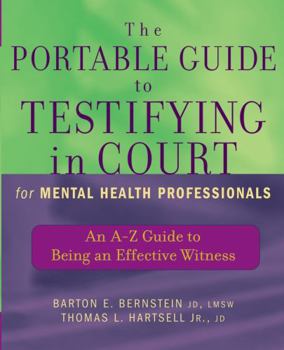The Portable Guide to Testifying in Court for Mental Health Professionals: An A-Z Guide to Being an Effective Witness
Select Format
Select Condition 
Book Overview
A one-stop guide to testifying in court for mental health professionals
Even the most seasoned mental health professionals can find themselves unnerved by the prospect of appearing in court, especially when presented with it for the first time. Those in the mental health field usually have no formal preparation for testifying in court, even though they often play an important part in many types of cases.
The Portable Guide to Testifying...
Format:Paperback
Language:English
ISBN:0471465526
ISBN13:9780471465522
Release Date:July 2005
Publisher:Wiley
Length:288 Pages
Weight:1.15 lbs.
Dimensions:0.6" x 7.6" x 9.2"
Customer Reviews
2 ratings
Forensic Psychology and Criminal Behavior
Published by Thriftbooks.com User , 14 years ago
This book is well written, outlined and has relevant and current research examples. I have found it to a be very useful tool for reference material for class writing assignments, as well as, threads of information to do independent research.
A Sensible and User Friendly Guide to a Frequently Difficult Situation
Published by Thriftbooks.com User , 17 years ago
Having been a practicing Licensed Clinical Social Worker for about 33 years now, I have, from time to time (thank goodness, rarely) found myself on the stand as either a 'simple' witness or, at times, as a certified expert witness. The experiences are amongst the most challenging and can be among the most awkward and unsettling of all of those a professional psychotherapist can have. How to answer questions and give helpful and relevant information without violating client confidentiality and without winding up being held in contempt for refusing to answer and chancing jail time for one's self is no situation for either amateurs, the inexperienced or the timid of heart. It is also no place for the uninformed. It is the last of these requisites that is nicely addressed in the book at hand. Understanding that the handling of giving legal testimony requires some deeper-than-rudimentary orientation to the legal/court system itself, the meaning of testimony and the specific consequences and expectations once one is presented as an 'expert' are taken into account as one can plainly see initially by scanning the Table of Contents. The basic organization of the volume speaks volumes, in-and-of itself about the understanding by the authors of the importance of these issues. The book is presented in eight parts, as follows: 1. The Judicial System 2. Testimony Versus Therapy 3. Preparing For Testimony 4. In The Courtroom 5. The Expert Witness's Tools 6. Other Expert Witnesses There is also an extensive set of Appendices that include sample forms, motions and other useful sources of relevant information - both in print and on line. Testifying in court, as an expert therapist, is not simply a matter of honestly answering any question asked to you by anyone. It is FAR more complex than that. This book, presented largely in the format of sample questions and answers, descriptive exemplary vignettes, summaries of seminal information and occasional highlighted "Legal Lightbulbs" that underscore certain seminal issues and areas of attention does a reasonable thorough job of addressing most of what you would need to be aware of. One issue that it, perhaps, does not dwell sufficiently on - from my point of view of course, is the ultimate subjective power of the judge. Yes, there are rules governing the behavior of the person in the black robe: however, judges, as a group, are not monitored seriously by either their peers or the governmental agencies of which they are a crucial part. They do what they want, when they want to - and each in his/her own way. The reality of this Wild Card in the courtroom is very difficult -perhaps even impossible to prepare for - except to be aware that it is one of the variables you may encounter once on the stand. Anyone who disagrees has not likely been on the stand in a real case - especially one where there are strong feelings and animosities involved - a situation more common than not in both Family and Criminal Court. The aut




